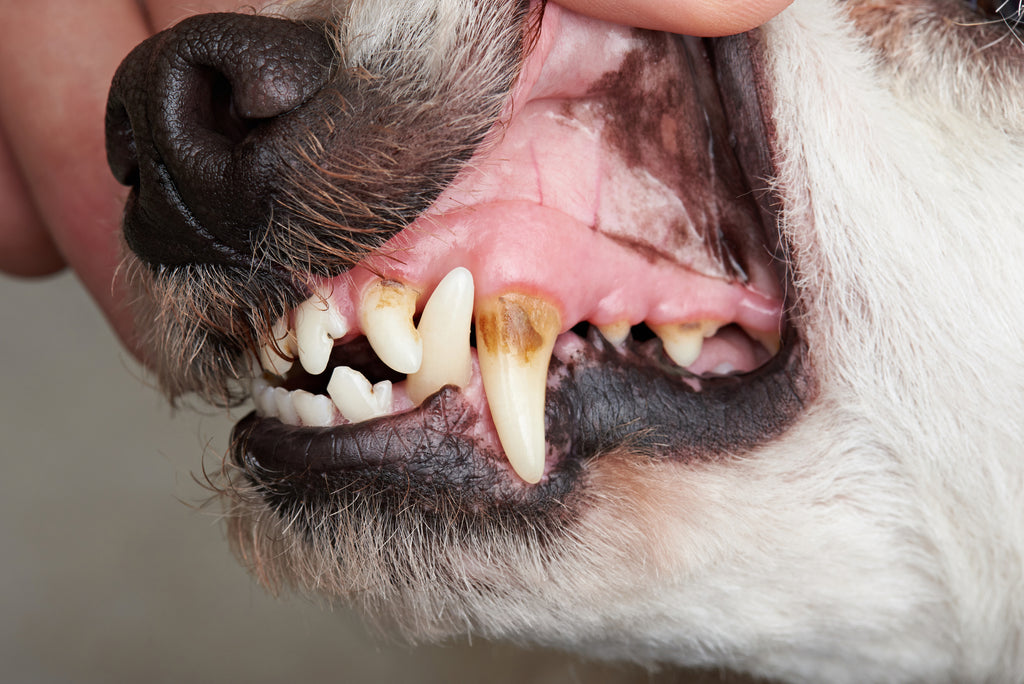There are several possible reasons why your dog’s breath may smell like fish:
1. Dental issues: Poor dental hygiene can lead to plaque and tartar buildup, which can cause oral infections and a fishy odor. Dogs that have gum disease, tooth decay, or infected teeth may have bad breath.
2. Anal gland problems: Dogs have anal glands that can become impacted or infected, resulting in a foul-smelling odor. In some cases, the odor can be similar to fish.
3. Digestive issues: Certain gastrointestinal conditions such as gastritis, inflammatory bowel disease, or food allergies can lead to malabsorption or indigestion, causing a fishy smell in the breath.
4. Diet: Some commercial dog foods contain fish or fish-derived ingredients. If your dog’s food contains fish, it can contribute to a fishy smell in their breath.
5. Kidney or liver problems: In rare cases, a fishy breath odor may be a sign of underlying kidney or liver disease. If the bad breath is accompanied by other symptoms such as increased drinking, urination, or weight loss, it’s important to consult a veterinarian.
If you’re concerned about your dog’s breath, it is recommended to consult a veterinarian to determine the underlying cause and appropriate treatment.
Know More About: why does my dogs breath smell like fish
Why Does My Dog’s Breath Smell Like Fish?
If you’re a dog owner, you’re probably quite familiar with the distinctive odor emanating from their mouths. Most commonly, this smell is described as “dog breath,” which can range from mildly unpleasant to downright offensive. But what if your furry friend’s breath smells like fish? As curious as it may seem, there are several reasons behind this peculiar aroma.
1. Oral Health Issues:
One of the primary culprits behind fishy dog breath is poor oral hygiene. Just like humans, dogs can develop dental problems such as gum disease, tooth decay, or gum infections. These conditions can lead to an accumulation of bacteria in your dog’s mouth, resulting in a fishy smell. It is important to regularly brush your dog’s teeth and maintain a proper oral care routine. Additionally, consider scheduling routine dental check-ups with your veterinarian.
2. Anal Gland Problems:
While it may sound unlikely, the scent of fish can sometimes be attributed to anal gland issues. Dogs have two small glands located near their anus, which produce a distinctive scent that is often referred to as “fishy.” When these glands become impacted or infected, they may release a foul-smelling secretion. If you suspect your dog is having anal gland problems, consult your vet for proper diagnosis and treatment.
3. Diet and Digestive Issues:
Dogs are known for their indiscriminate eating habits, which can lead to an upset stomach and digestive problems. Certain foods, such as seafood, can leave a lingering odor in a dog’s breath. Feeding your furry friend a diet rich in fish-based ingredients may result in fishy breath. Moreover, frequent bouts of diarrhea or other gastrointestinal issues can also contribute to an unusual smell. Monitoring your dog’s diet and addressing any digestive concerns can help alleviate this problem.
4. Ketoacidosis:
Ketoacidosis is a metabolic disorder that affects dogs, primarily those with diabetes or pancreatitis. It occurs when their bodies cannot utilize glucose for energy and start using fats as an alternative source. This metabolic shift can produce a distinct odor, which can be characterized as fishy. If you suspect your pup may be experiencing ketoacidosis, it is crucial to seek immediate veterinary care.
5. Underlying Health Conditions:
Persistent fishy breath in dogs may also indicate an underlying health condition. Conditions such as kidney disease, liver dysfunction, or respiratory infections can produce odors that manifest as fishy breath. If you notice a chronic fishy smell or any other alarming signs, consult your veterinarian for a thorough examination and proper diagnosis.
In conclusion, while dog breath is often considered normal, a distinct fishy smell can be indicative of various underlying issues. From oral health problems to dietary factors and even metabolic disorders, there are several potential reasons why your dog’s breath may resemble fish. It’s essential to rule out any serious health concerns and work closely with your veterinarian to maintain your furry friend’s overall well-being. By addressing the root cause and implementing appropriate measures, you can help keep your canine companion’s breath fresh and ensure their optimal health.
Key Takeaways from why does my dogs breath smell like fish
There are a few key takeaways as to why your dog’s breath may smell like fish. Firstly, it could be due to poor dental hygiene. Tartar, plaque, and bacteria buildup in their mouth can cause a fishy odor. Secondly, gastrointestinal issues, such as an upset stomach or gastroesophageal reflux, could be the culprit. These conditions can lead to regurgitation or acid reflux, causing the fishy smell. Additionally, if your dog consumes fish-based food or treats, their breath may naturally have a fishy scent. To address this issue, ensure regular dental care, consider switching their diet, visit a veterinarian to rule out any underlying health problems, and maintain overall good oral hygiene for your furry friend.
FAQs on why does my dogs breath smell like fish
1. Why does my dog’s breath smell like fish?
The most common reason for your dog’s breath smelling like fish is due to dental issues such as gum disease or tooth decay. These can cause bacterial growth, resulting in a fishy odor.
2. Is it normal for a dog’s breath to smell like fish?
No, it is not normal for a dog’s breath to smell like fish. It usually indicates an underlying dental problem or oral infection that needs attention from a veterinarian.
3. Can the food my dog eats cause their breath to smell like fish?
Certain types of fish-based dog foods or treats can contribute to a fishy odor in their breath. However, if the smell intensifies or persists, it’s essential to rule out dental issues as the primary cause.
4. How can I prevent my dog’s breath from smelling like fish?
Regular dental care is crucial. Brushing your dog’s teeth frequently, providing dental chews, and scheduling professional cleanings can help prevent the buildup of bacteria and foul odor.
5. What other health conditions could cause fishy breath in my dog?
Besides dental issues, gastrointestinal problems such as stomach disorders or improper digestion may also lead to an unpleasant odor on your dog’s breath.
6. Are there any home remedies to alleviate my dog’s fishy breath?
While home remedies like adding fresh parsley to your dog’s diet or using mouthwash designed for dogs may help slightly, it is still crucial to address any underlying dental or health issues with a veterinarian.
7. Will changing my dog’s diet help improve their breath odor?
Switching your dog to a high-quality, nutritious diet might have a positive impact on their overall oral health and breath odor. However, it should complement proper dental care rather than replace it.
8. Can fishy breath in dogs be a sign of a serious medical condition?
In some cases, yes. Persistent fishy breath, accompanied by other symptoms like vomiting, diarrhea, or a change in eating habits, could indicate more severe health issues such as kidney disease. Consult your vet if concerned.
9. Could my dog’s fishy breath be a result of licking or eating something unusual?
It is possible. Dogs often explore their surroundings with their mouths, and if they consume something fishy or spoiled, it can lead to a temporary fishy smell in their breath. Monitor their behavior and consult a vet if symptoms persist.
10. How can my veterinarian diagnose and treat my dog’s fishy breath?
The vet will typically perform a thorough dental examination, looking for signs of decay, gum disease, or oral infections. Based on the findings, they may recommend professional cleanings, extractions, or further tests for underlying health issues.

